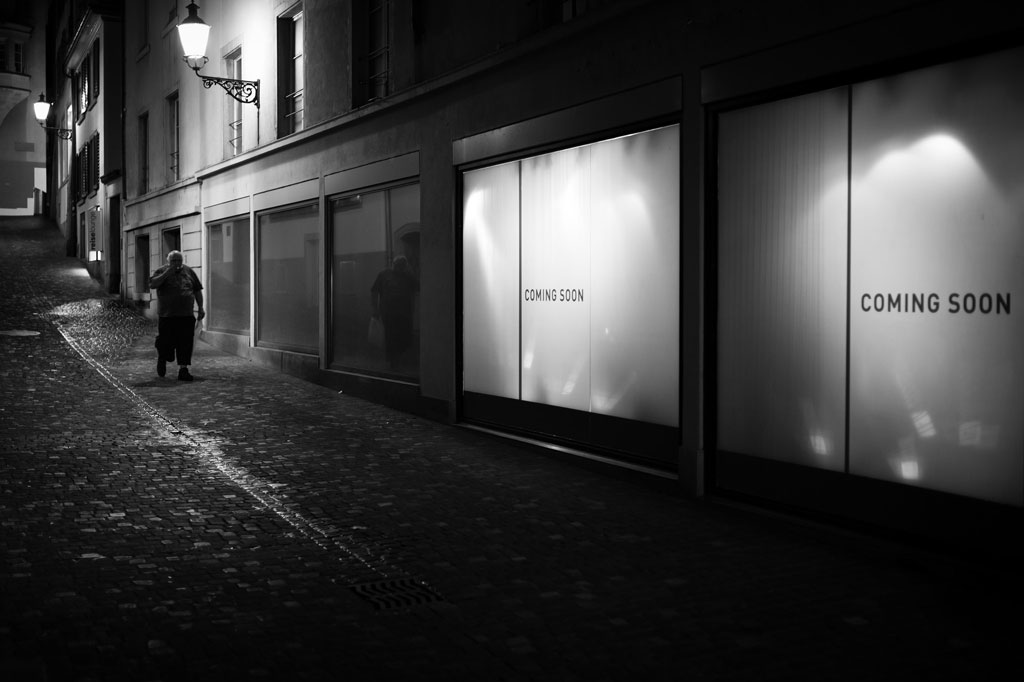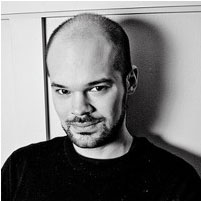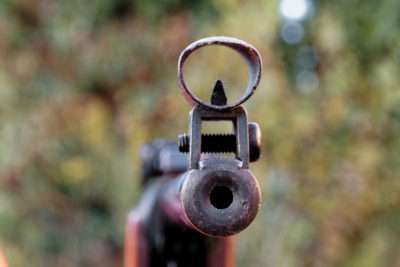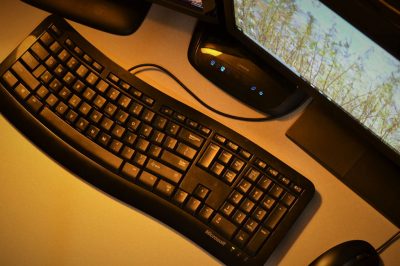
Nick Kolakowski
ALONE WITH YOUR OWN DISASTER
By the day after the storm, the owner of the bar where I worked had fled the city, leaving me in charge by default. I kept the place open, mostly to serve those volunteers clearing the muddy streets of wreckage; I refused to take their money, because I’d always hated the owner.
This far downtown, there was still no electricity, so I improvised my own mood lighting. By one thirty on the morning in question, the candles along the bar had burnt down, hissing and sputtering, to pools of molten wax in their dishes. The last drinkers had left. I was spending an idle moment at the liquor shelves behind the bar, rotating the bottles so the labels faced outwards, when I heard the front door open again.
“How goes it?” I said, eyeing the pale blur of the visitor’s reflection in the nearest fifth of whiskey.
The blur flowed to a seat at the bar, saying nothing. I turned and faced a man in a rubbery white skull mask, holding a pistol. Deep within the black pools of his eyeholes, I could see the flickering orange of his pupils reflecting the candlelight.
My heart thundered—with fear, yes, but also anger. I had been providing a service, keeping this bar open. And someone was taking advantage of that fact.
“The money,” he said.
“There’s no money,” I replied.
“Don’t screw with me,” he said, jabbing the gun at my face. “I’ll shoot you dead right here.”
“I’m not charging money for drinks. You want what’s in my wallet?” I reached very slowly into my hip pocket, making sure to grip my leather billfold with only the thumb and forefinger. “A whole five bucks there, my driver’s license, a couple receipts.” I tossed it on the bar in front of him.
The skull tilted down; his other hand examined the treasure. “Uh, and some credit cards.”
“I wouldn’t try them. Maxed out to hell.”
The head drooped further. “Why you open?”
I considered grabbing for his gun, and thought better of it. Guns have a funny way of going off by accident, and besides, his energy seemed like it was dribbling out onto the bar. “I’d say everybody could use a drink right now.”
“Yeah. You could make a killing, selling it. I don’t know any liquor stores open down here.”
“I want to be helpful. And I’m not good at digging things out. Bad back.”
The skull had nothing to say to that, at least at first, so I waited, focusing my gaze on the low candles to our right, spurting smoke as they died. He sighed, tilted his pistol to the side, fumbled the safety on, and slipped the weapon down the back of his jeans. I still kept my mouth shut. Only when he slipped off the mask did I turn to face him fully, and found myself eye-to-eye with a balding, round-cheeked subway drone, middle-aged and clearly exhausted.
“Sorry,” he said, placing the mask on the bar beside him.
“You want a drink?” It seemed natural to offer.
“Sure.”
I poured him a whiskey from a cheaper bottle. “Sorry,” he said again.
“Why’d you try to rob me?”
He gave me a quizzical look. “The money.”
I shrugged. “Obvious.”
“I’ve never done it before.” He slugged down the alcohol. “I mean, I’ve needed money for a long time, a long time. Never had the balls to try anything, because I’m not a criminal, I’m not stupid, I knew I’d get caught pretty quick if I tried anything. Then this happened—the storm.”
“And that suddenly made it okay?” I poured a drink for myself.
“I can’t explain it. It’s like a different world out there, at least for a little while. No cops, nobody seeming to care. I’ve walked by this place a bunch. And this afternoon I decided, why not?”
“The storm, it’s brought out the weird in people.”
“Yeah.”
“Worst stuff I’ve ever seen personally, you know, the wreckage,” I said. “Houses collapsed, people’s stuff lost. It eats at you.”
“Doesn’t eat at me.”
“What?”
“The South Tower, fiftieth floor. That was the worst.”
“Nine Eleven.”
“Yeah. Remember, they hit the North Tower first. We saw it out the window, not the plane but the fire, the stuff coming down. Intercom was telling everyone stay in their offices, I was thinking screw that, I need to leave, take the stairs.”
“Yeah.”
“So I’m in Stairwell A when the second plane hits the South Tower. The whole building shook. I thought a piece had come off the North Tower, smashed into us. Not the case. People around me were screaming. Now I’m pretty tough, you understand?”
“Yeah.”
“I’m pretty tough, I grew up in a bad part of Queens, I can handle myself, but right now I’m panicking, yelling at the bitch in front of me to move her ass faster. Inexcusable language. I always thought, I see that lady again, I’d apologize. Because I didn’t know what was up, but I knew it was bad, we had to get out.”
“Yeah.”
“Someone behind me saying a plane hit our building. I knew it was an attack. The first plane might have been an accident, aircraft out of control or something, but the second? We all knew. Ahead of me, maybe two floors down, there’s this man in a turban and a suit, some worker heading down like the rest of us. And these three other guys, they just turn around and start beating the shit out of him, I mean full blast, kicking, punching, yelling about terrorists. The turban guy’s begging them to stop, saying he’s worked in the building five years, he’s a citizen, he’s Sikh, all that.”
“Shit.”
“Whenever I’ve told someone that story, they think I’m making it up, like I want to make the whole situation more dramatic than it is. I got no reason to do that. The worst part was, I did nothing. I walked right past, close enough to reach out and touch them. I was so focused on getting out, on saving my own ass. That’s the part I still think about. It would have taken three seconds to grab that man in the turban and pull him loose. Maybe I was scared they would’ve jumped me, too. I should have risked it.”
“You can’t blame yourself.” What else could I say?
“Oh yes, I can. It’s very easy. The beat-down in the stairwell, it’s the one thing that refuses to leave my head. Everything else—the people falling from up above, the sounds, the ash—that’ll all slip my mind, come back only when I see something reminds me of it. The beating keeps playing on repeat, because it’s the one thing that day I could have changed. You don’t need to say anything.”
“I wasn’t going to.”
“Don’t say anything. Just listen. We leave the building, past the firefighters prepping to head inside, writing their social security numbers on their arms in black marker. I looked up and saw someone tumbling from the North Tower, a big white sheet in his hands like he’s trying to parachute. The wind whipped the sheet away and he plunged. They were all plunging, one after the other, so fast it tore away their clothes and shoes. I couldn’t look anymore, but I heard. When they hit the ground it made this boom echoed off the buildings. Don’t say anything. I’m fine. The news stopped showing the videos of the people falling, and it was the one human thing the news did. I ran a couple blocks away and stood where I could still see the entrance to the South Tower. I was waiting for the man in the turban to come out. I never saw him. For all I know, he was still in that stairwell when the tower collapsed.”
“I still think you can’t blame yourself.”
“Why?”
“I don’t know. Because.”
“That’s a solid reason.”
“I don’t know.”
“I’m not one of those guys, walking around wearing that day on my sleeve. Those guys, everyone they meet, thirty seconds later they’re talking about the funerals they went to, the friends they lost. Ten, fifteen years later they’re still talking about it. You ever notice, the second you start talking to a friend about something bad, they shut down on you? Their faces a total blank, eyes moving like they can’t wait to escape. Nobody wants to hear that stuff. I’m okay. Pass me that bottle. I just want another shot.”
“I like listening to people.”
“Why?”
“I used to be a writer.”
“Where were you that day?”
“Nine Eleven? In Chicago, working in my office, my editor comes in and tells me two planes hit the towers. We walk into the conference room, someone’s turned on the television. We sat for hours.”
“Everybody feeling traumatized?”
“Well, yeah.”
“Bullshit. They weren’t there. They didn’t smell that dust.”
“I think you can still be traumatized.”
“Can you? Here’s a question: people outside of New York start talking about this storm, Sandy, saying how horrified they are, what’s your first reaction? You get angry, want to tell them to shut the fuck up, don’t you?”
“Yeah.”
“Imagine that times ten. Times a hundred. That’s how I feel about it. That’s how everyone who was there feels, whether they’re ranting it out or keeping it bottled up inside. And you know what? Nobody cares, not really. Those Special Forces guys fly into Pakistan and blow bin Laden’s brains out, I’m watching on the news all these college kids in front of the White House cheering and waving the flag, rah-rah, except half of them were toddlers when the towers came down. They don’t understand, not really. My ex-wife didn’t understand. My kids don’t understand. You don’t understand. The survivors, we’re alone, just like everyone who went through Sandy is alone. You’re always alone with your own disaster.”
I passed him a fresh bottle, and he nodded and poured his glass full to the brim. He seemed to want solitude, finally, so I picked up my book from underneath the bar and headed out onto the front stoop to read, taking a candle in a bowl for light. An hour or so later, I glanced back inside, and saw him still at the bar, head stooped, the bottle empty beside his hand. He had slipped the skull mask back on.

Nick Kolakowski’s work has appeared in The Washington Post, McSweeney’s,The Evergreen Review, 7×7.la, Carrier Pigeon, and Shotgun Honey, among other publications. He’s also the author of How to Become an Intellectual, a book of comedic nonfiction, and Somebody’s Trying to Kill Me, a short-story collection. His flash fiction “Little Orestes” appeared in Issue No. 8 and his story “The Valley” appeared in Issue No. 10 of Cleaver. His poem “Illuminati Dance” appears in this issue. He lives and writes in New York City.
Image credit: Tobi Gaulke on Flicker
Read more from Cleaver Magazine’s Issue #15.



